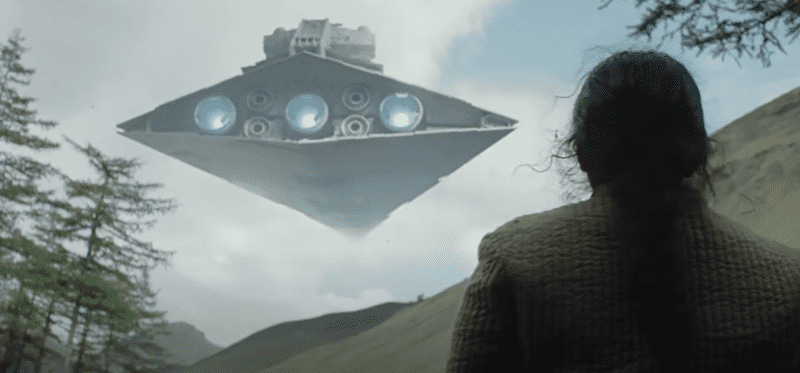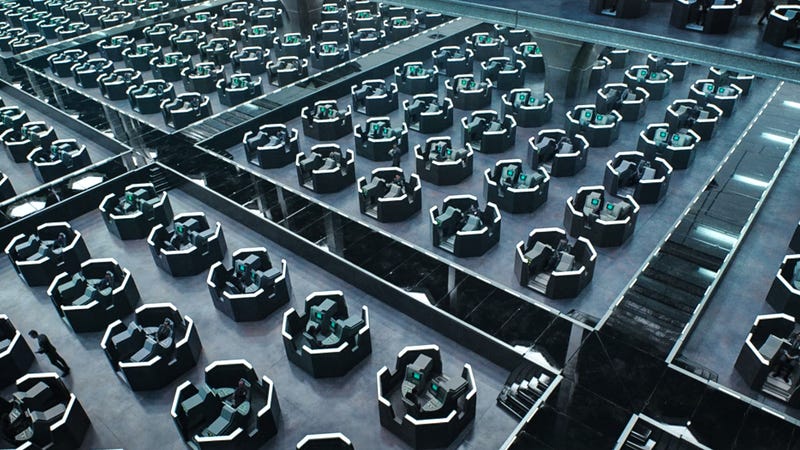'One Way Out': A piece on Andor.
17 July 2023
What happens when you bring in someone who isn't a Star Wars fan to write a Star Wars show.
I forgot what it was like to experience a story so inspiring and moving that inspires new ideas in you. It’s an intoxicating feeling that’s far too rare nowadays. I found it in the last place I expected to find it, in a Disney Star Wars show.
Chapter 1: The Mechanics Of Oppression
The Empire is a disease that thrives in darkness, it is never more alive than when we sleep. It’s easy for the dead to tell you to fight, and maybe it’s true, maybe fighting is useless. Perhaps it’s too late. But I’ll tell you this… If I could do it again, I’d wake up early and be fighting these bastards from the start. Fight the Empire! – Maarva Andor
The Empire, in Star Wars media, is usually seen as an incompetent force. An obstacle to overcome, a villain to the cause.
This is not the case in Andor. In Andor, The Empire is terrifying in its sheer magnitude. It seeks complete control, and every person is not even a cog in the machine, they’re a miniscule spoke of that cog. This show takes its time impressing the sheer weight the Empire would have on any normal person trying to live in the Galaxy.
The Empire in the pursuit of industry and profitability, destroys local cultures and herds them like sheep into their suffocating systems. They keep people in line with the threat of sentences. They source labour from prisons where the prisoners are never truly allowed to leave.
This is the first time, in the history of Star Wars, that the Empire is truly a villain. Sure, we understood why the Empire is evil, but why would the average civilian living in this landscape even care to fight? That is what this show at its core, seeks to answer.
But this show never relents in its ability to make you stop and think, because no matter how evil the Empire may be, it’s still filled with people like you and me. The soldiers are seen playing cards, asking for permission to see a beautiful sky, fearful for their lives, trying to do their best and achieve their best. The Empire isn’t soulless, it’s filled with people that just want to live their lives.
This fact makes it much more terrifying to me. The idea that anyone can be influenced to support the atrocities that the Empire commits. It’s something that is based in real-world history, remember that 90% of the Germans back in the 1940s supported Hitler. The very same Hitler responsible for the deaths of 6 million Jews.
Nemik talks about how The Empire works hard to make you forget the concepts of freedom, rebellion and justice, because they’re not profitable to their ideologies and prime directive. This harkens back to George Orwell’ 1984, where Newspeak slowly deleted words that would even inspire or encourage thoughts that could spark rebellion or resistance.
Chapter 2: The Cost Of Rebellion
“I burn my life for a sunset someone else will see.”
- Luthen
The Rebels in the show aren’t heroes. They’re sometimes just as evil as the Empire can be. Luthen is seen shrouded in black cloaks, reminiscent of The Empire’s leader, Palpatine. Vel is tasked with killing Andor, simply to protect the cause. Mon Mothma must marry her own underage daughter off to finance her covert funding of Rebellion operations.
It’s all shades of gray. The reason this is such an exciting and interesting addition to the Star Wars canon is because it changes absolutely nothing about the original trilogy or the prequels, but what it does do, is make you see those movies in completely new ways. The celebrations at the end of Return Of The Jedi, have a sense of loss to them too now, every scene of the Death Star will remind you of the fact that Cassian Andor helped build the tool that would kill him, against his will.
Chapter 3: One Way Out
“I would rather die trying to take them down than giving them what they want.” - Kino Loy
One Way Out is an episode that stands as one of the finest in all television.
Narkina 5 is the most terrifying institution that I can ever imagine. A prison with no bars. The constant threat of being tortured. The paralysing fear of not doing work that is satisfactory to the Empire’s standards. The suffocating restriction of having little to no knowledge.
In many ways, this prison is a metaphor for The Empire as a whole. The feeling that the Empire is watching your every move. The fact that it’s everywhere. The Empire forcing you to only think about yourself because the only threat to itself is when people unite and fight back. Narkina 5 is a brilliant depiction of the Empire.
There is only One Way Out. Freeing everyone, devoid of selectivity. The only way out is to fight back.
Chapter 4: Perspective
People don’t look down to where they should. They don’t look down, they don’t look past the rust. Not us though, eh? Eyes open, possibilities everywhere. - Clem Andor
People eat in this show. That’s a very strange thing to point out, but it works in this show for many reasons. This show has so many scenes of people eating, sleeping, playing cards, going home to their parents. There’s so much effort put into showing just how human and normal these people are.
This show explores in painstaking detail, why normal people, not the Jedi or the Sith, but the average man is impacted by The Empire’s power. The imagery in this show takes a lot of time to impress that upon you, too.
There’s this one scene in Episode 6 where Cinta sees a Star Destroyer for the first time. We as the audience know what Star Destroyers are, and they’re simply obstacles to us, but in the show, they’re terrifying gargantuan behemoths that truly impress upon you, that the Empire is beyond our imaginations of scale.
 The crazy part is the pieces are all there since the first film back in 1977. The scale was all there, we subconsciously knew and understood just how big the Empire was. This is the first show to take that concept and do something magnificent with it.
The crazy part is the pieces are all there since the first film back in 1977. The scale was all there, we subconsciously knew and understood just how big the Empire was. This is the first show to take that concept and do something magnificent with it.

Chapter 5: Oppression Is The Mask Of Fear
The Imperial need for control is so desperate because it is so unnatural. Tyranny requires constant effort. It breaks, it leaks. Authority is brittle. Oppression is the mask of fear. - Nemik’s Manifesto
The final nail in the coffin of The Empire’s ideology, and perhaps the most inspiring speech in this show, is Nemik’s Manifesto.
What this show does differently than any other show about rebellions and empires is that, it treats the rebellion as an almost inevitable part of being under an empire. Impose control and the people will inevitably fight back.
“We need the Empire to help. We need them angry. We need them coming down hard. Oppression breeds rebellion.” – Luthen
Every action has its own equal and opposite reaction. The more the Empire exerts control, the more the people start to fight back.
Perhaps what made this show work so well is that we get to see the heroes winning, if we’ve seen the original Star Wars films. But even if they didn’t, this is true Star Wars. Holding on to hope even when times are tough. Holding on to hope when there seems to be no way out.
In short, Andor is nothing less than a masterpiece. Tony Gilroy took the pieces of Star Wars and crafted one of the finest stories I’ve seen. I’m anxiously waiting for Season 2.